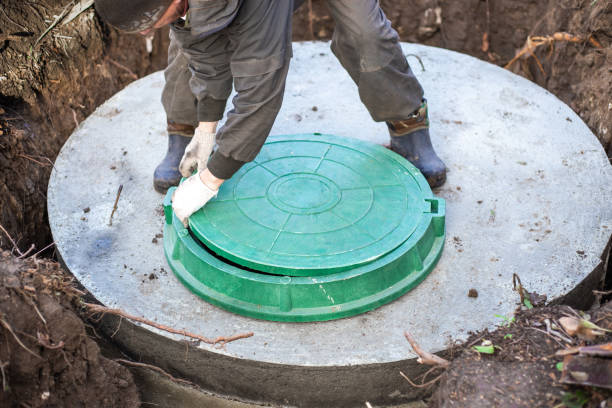In the intricate world of waste management and environmental conservation, the nitrogen levels in septic systems play an unexpectedly pivotal role. While many homeowners focus primarily on properly functioning their septic tanks, the broader ecological impacts of these systems often go overlooked.
Excess nitrogen from septic systems can seep into waterways, promoting algal blooms and deteriorating water quality. These elevated levels’ repercussions extend to the environment and public health. This article delves into the importance of nitrogen reduction in septic systems, highlighting its significance for maintaining a balanced ecosystem and ensuring clean water for communities.
Why is Nitrogen Bad in Septic Systems?
Nitrogen is a naturally occurring element and an essential component of septic tank effluent. However, it is crucial to reduce the nitrogen level in your septic system due to potential issues it can cause for both the environment and the system itself.
Excessive nitrogen can lead to the following problems:
-
Algae Overgrowth
High nitrogen levels lead to increased algae growth. Algae not only impacts the aesthetics of the septic system but can also clog pipes and pumps. Excessive algae can also block sunlight from reaching essential plants, leading to algal blooms that deplete oxygen in water bodies and harm aquatic life.
-
Impact on Groundwater Quality
Nitrogen compounds, specifically nitrates, can potentially infiltrate the groundwater from the septic system’s drain field. Excessive nitrates in groundwater can contaminate drinking water sources, rendering them hazardous for human consumption.
This becomes especially concerning for vulnerable groups like infants and pregnant women, as elevated nitrate levels in drinking water can lead to a condition known as methemoglobinemia or “blue baby syndrome.” This condition interferes with the blood’s capacity to carry oxygen, posing significant health risks to affected individuals.
-
Nutrient Pollution
Excessive nitrogen can contribute to nutrient pollution in nearby water bodies. When nitrogen-rich effluent reaches lakes, rivers, or coastal areas, it can cause an overabundance of nutrients, leading to eutrophication. This process stimulates excessive plant and algae growth, depleting oxygen levels in the water and creating dead zones where aquatic life cannot survive
-
Soil Saturation
High nitrogen levels can saturate the soil in the drain field, hindering its ability to effectively treat wastewater. Soil saturation reduces the natural filtering and treatment processes, leading to inadequate removal of harmful pathogens and pollutants. As a result, untreated wastewater may find its way into the groundwater, posing a risk to human health and the environment.
How to Reduce Nitrogen in Your Septic System
Reducing nitrogen discharge from septic systems is crucial to mitigate its negative environmental and human health impact. Here are some effective measures homeowners can adopt:
-
Regular pumping
Schedule regular septic tank pumping to prevent excessive nitrogen release. Routine maintenance helps remove accumulated solids and sludge, reducing the organic load that reaches the drain field. As a result, nitrogen concentrations are lowered, minimizing the risk of groundwater contamination and toxic algal blooms.
Homeowners should adhere to recommended pumping frequencies to ensure their septic systems function efficiently, safeguarding the environment and public health
-
Make use of a Nitrogen-reducing filter
Install a nitrogen-reducing filter to mitigate the environmental and health impacts of excessive nitrogen discharge from your septic system. This filter helps to remove nitrogen compounds before wastewater reaches the drain field, reducing the risk of groundwater contamination and algal blooms. It’s a simple and effective solution to safeguard your family’s well-being and the ecosystem.
Regular filter maintenance ensures optimal performance, creating a cleaner and healthier environment.
-
Upgrade to advanced treatment systems
Consider upgrading your septic system with state-of-the-art treatment technologies to reduce nitrogen discharges by 50% or more. Options such as aerobic treatment units, denitrification systems, and recirculating media filters are proven to break down and remove nitrogen compounds more effectively, resulting in higher-quality discharged wastewater.
Before proceeding with any upgrades, consult a septic system professional to determine the most suitable technology for your property and to ensure proper installation.
-
Reduce your water usage
Reducing water usage in your household can indirectly help reduce nitrogen in your septic system. The less water entering the system, the lower the amount of wastewater and nitrogen that needs treatment. Simple water-saving practices like fixing leaks, using water-efficient appliances, and being mindful of water consumption can make a difference.
By optimizing water usage, you not only help the environment but also prolong the life of your septic system and reduce the need for frequent pumping.
-
Avoid flushing harmful chemicals
Chemicals like bleach, disinfectants, and certain household cleaning agents contain nitrogen compounds that can harm the septic system’s natural processes. Avoid flushing these chemicals down the drain whenever possible.
Opt for environmentally friendly alternatives or dispose of these chemicals through appropriate channels rather than allowing them to enter the septic system. This way, you can prevent further nitrogen contamination and support the system’s ability to break down waste naturally.
Conclusion
Navigating the complexities of septic systems can seem daunting for many homeowners and businesses. From installation to routine maintenance, ensuring that your waste management system is efficient and environmentally friendly is paramount. VI REEL stands at the forefront of septic solutions, offering top-tier installation, rigorous inspection, timely repairs, and thorough maintenance services. Our commitment goes beyond just providing a service – it’s about safeguarding the environment and ensuring your peace of mind. Dive into a hassle-free and sustainable waste management journey with us.
Don’t wait for a septic crisis to strike! Choose sustainability and reliability with VI REEL. Book your inspection or service today and make a direct impact on the health of our shared environment.


